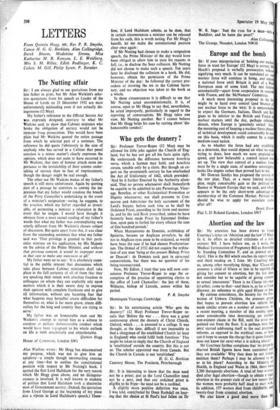Who gets the deanery ?
Sir: Professor Trevor-Roper (12 May) may be allowed his little joke against the Church of Eng- land, but he has not got all his facts quite right. He understands the difference between beneficia mera, which a layman may hold, and beneficia curata, tenable only by a cleric. But though an ex- pert on the seventeenth century he has overlooked the Act of Uniformity of 1662, which provided: 'And be it further Enacted by the Authority afore- said, That no person whatsoever shall thenceforth be capable to be admitted to any Parsonage, Vicar- age, Benefice, or other Ecclesiastical Promotion or Dignity whatsoever, nor shall presume to Con- secrate and Administer the holy sacrament of the Lord's Supper, before such time as he shall be Ordained Priest, according to the form and manner in, and by the said Book prescribed, unless he have formerly been made Priest by Episcopal Ordina- tion, upon pain to forfeit for every offence the sum of One hundred pounds.'
When Marcantonio de Dominis, archbishop of Spalatro, became an Anglican proselyte, he did not in Anglican eyes cease to be ordained, as would have been the case if he had chosen Presbyterian- ism. The Ordeal of 1552 did not require the ordina- tion of any man 'being at this present Bishop. Priest or Deacon': de Dominis took part in episcopal consecrations, but there was no question of his being reconsecrated.
Now, Mr Editor, I trust that you will now com- mission Professor Trevor-Roper to urge the re- sumption of the practice of appointing clerics to the office of Lord Chancellor: the last of these, Williams, bishop of Lincoln, comes within his period.


































 Previous page
Previous page